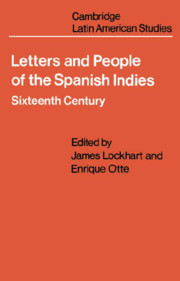Book contents
- Frontmatter
- Contents
- Preface
- Part I Conquest
- Part II The Variety of Life in the Indies
- 11 An encomendero's establishment
- 12 An encomendero's opinions
- 13 The miner
- 14 Commerce across the Atlantic
- 15 The professor of theology
- 16 The new arrival
- 17 The tanner and his wife
- 18 The troubadour
- 19 The nephew
- 20 The garden and the gate
- 21 The woman as settler
- 22 The farmer
- 23 The petty dealer
- 24 The Flemish tailors
- 25 The nobleman
- 26 The Hispanized Indian
- 27 Indian high society
- 28 An Indian town addresses the king
- Part III officials and Clerics
- Bibliography
- Index
11 - An encomendero's establishment
from Part II - The Variety of Life in the Indies
Published online by Cambridge University Press: 06 August 2018
- Frontmatter
- Contents
- Preface
- Part I Conquest
- Part II The Variety of Life in the Indies
- 11 An encomendero's establishment
- 12 An encomendero's opinions
- 13 The miner
- 14 Commerce across the Atlantic
- 15 The professor of theology
- 16 The new arrival
- 17 The tanner and his wife
- 18 The troubadour
- 19 The nephew
- 20 The garden and the gate
- 21 The woman as settler
- 22 The farmer
- 23 The petty dealer
- 24 The Flemish tailors
- 25 The nobleman
- 26 The Hispanized Indian
- 27 Indian high society
- 28 An Indian town addresses the king
- Part III officials and Clerics
- Bibliography
- Index
Summary
Andn!s Chacon, encomendero of Trujillo, Peru, presently in the valley of Casma, to his brother Francisco Chacon in Los Hinojosos, New Castile, 1570
… so that there are twenty or twenty-five people eating th ere …
With this letter we mean chiefly, in the face of the individuality and crustiness of its writer, to give a £lesh-and-blood illustration of that social-economic complex which was associated with the encomienda, and which we have alluded to before (Letter 7). Located in Trujillo, a secondary city in the Peruvian scheme of things, with far from the richest encomienda in his district, spending much time out in the country acting as his own majordomo, married to good plebeian Ana Lopez, our Andres Chacon is no full exemplar of an ideal, like the great lords of Cuzco or Charcas, who were always in the cities, cushioned by their two or three echelons of stewards, married to dona Isabel Manrique de Lara or some such. But in the nature of his establishment, in employing many people and having his hand in everything, Chacon is representative. Here one can see all the better that no encomendero with any reasonable source of income at all was without his sheep, goats, pigs, cows and horses, his orchards, his wheat farm and mill, his Spanish employees and black slaves, his big house in town where many people were fed. And he could be counted on to get involved in other aspects of the local economy that looked especially promising, here silver mining.
All this is not only basic to the organization of sixteenthcentury society, it also points ahead, because the complex, as a pattern, would outlive the encomienda itself and survive in later estate forms. Everywhere the trend was for the encomenderos to put increasing emphasis on the more flexible, secure private aspect of their estates, which with the growth of Spanish cities often became the more lucrative part as well, so that as their rights to Indian tribute diminished under attack from nonencomendero Spaniards and crown officials, many maintained their economic position quite well. Another reason for emphasizing enterprises over tribute was the continued decrease of the tribute-paying Indian population.
- Type
- Chapter
- Information
- Letters and People of the Spanish IndiesSixteenth Century, pp. 64 - 70Publisher: Cambridge University PressPrint publication year: 1976



